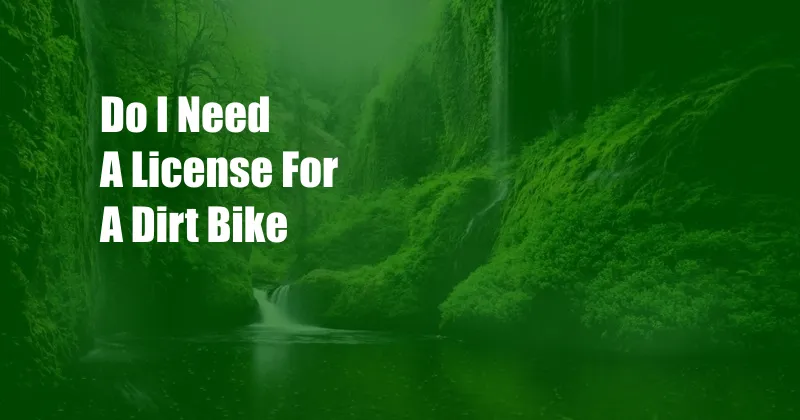
Do I Need a License to Ride a Dirt Bike?
As a seasoned dirt bike enthusiast, I’ve experienced firsthand the exhilarating rush and satisfaction that comes with navigating rugged trails and conquering challenging terrain. However, I’ve also witnessed the importance of abiding by legal regulations to ensure safety and respect for the environment. One of the most commonly asked questions I encounter is whether a license is required to operate a dirt bike. The answer is not as straightforward as you might think.
Licensing Regulations: A State-by-State Perspective
The regulations governing dirt bike licensing vary significantly from state to state. In some states, specific licenses are mandated for operating off-road vehicles, while others may have no such requirements. It’s crucial to check with your local Department of Motor Vehicles (DMV) to determine the specific regulations applicable to your state. States with mandatory licensing typically issue designations such as an Off-Highway Vehicle (OHV) license or a Motor Vehicle Operator’s Permit (MVOP). In these states, operating a dirt bike without a valid license can result in fines, impoundment of the vehicle, and even criminal charges.
Understanding the Exceptions: Private Property and Competition
It’s important to note that the licensing requirement may not apply in certain situations. For instance, if you’re riding your dirt bike solely on private property with the landowner’s permission, you may not need a license. However, if you intend to venture onto public trails, roads, or racing competitions, a license is generally required. Additionally, some states may have additional regulations or age restrictions for riding dirt bikes on public roads or in designated off-road parks.
The Importance of Licensing: Safety and Environmental Preservation
Obtaining a license is not merely a legal requirement but also a testament to your commitment to safety and responsible riding. By passing a written test and demonstrating proficiency in handling an off-road vehicle, you demonstrate your understanding of the rules and regulations governing dirt bike operation. Licensing also ensures that you possess the necessary knowledge and skills to operate your vehicle safely, minimizing the risk of accidents or injuries to yourself or others. Furthermore, licensing plays a role in preserving the environment by promoting responsible riding practices that minimize soil erosion, trail damage, and noise pollution.
Tips and Expert Advice for Responsible Riding
-
Enroll in an OHV Safety Course: Many states offer Off-Highway Vehicle Safety Courses that provide comprehensive instruction on safe and responsible riding practices. Completing a course can enhance your skills, boost your confidence, and may even qualify you for discounts on insurance or license fees.
-
Read the Rider’s Manual: Familiarize yourself with the manufacturer’s guidelines for your specific dirt bike model. The manual will provide valuable information on proper maintenance, safety features, and operating procedures.
-
Wear Proper Gear: Always wear a helmet, gloves, boots, and other protective gear when riding. This gear can significantly reduce the risk of injury in case of an accident.
-
Ride Responsibly: Adhere to trail rules, respect other riders and hikers, and avoid excessive noise or disturbing wildlife. Responsible riding practices not only enhance your own enjoyment but also foster a positive image for off-road enthusiasts.
Frequently Asked Questions on Dirt Bike Licensing
Q: Can I ride a dirt bike on the road without a license?
A: In most states, it’s illegal to operate a dirt bike on public roads without a valid license or permit.
Q: What are the age requirements for riding a dirt bike?
A: Age restrictions vary by state. Check with your local DMV for specific regulations.
Q: Is there a difference between a dirt bike and an ATV?
A: Yes, dirt bikes are designed for riding on unpaved trails and off-road terrain, while ATVs are typically used for recreational or utility purposes on various surfaces.
Conclusion
While licensing requirements for dirt bike operation vary from state to state, it’s essential to check with your local authorities to determine the specific regulations applicable to you. By obtaining a license, following safety guidelines, and riding responsibly, you can enjoy the exhilarating experience of dirt biking while minimizing risks and promoting environmental preservation.
Are you an avid dirt bike enthusiast or curious about exploring this thrilling hobby? Share your thoughts and experiences in the comments below!